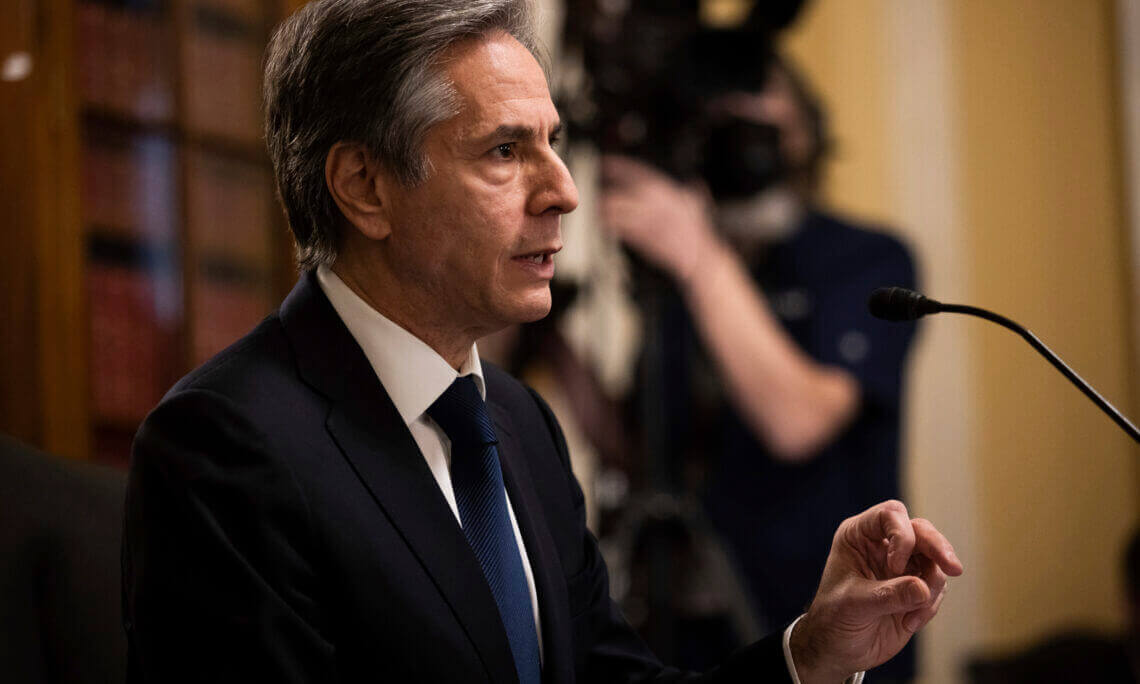On Tuesday, United States (US) Secretary of State Antony Blinken said that sanctions on Iran would continue even if an agreement is reached to restore the 2015 nuclear deal. Blinken’s statements come as Iran and world powers are holding talks in Vienna, Austria to restore the landmark nuclear deal, also known as the Joint Comprehensive Plan of Action (JCPOA).
“I would anticipate that even in the event of a return to compliance with the JCPOA, hundreds of sanctions will remain in place, including sanctions imposed by the Trump administration,” Blinken told a Senate committee. He also added that if the sanctions are “not inconsistent” with the JCPOA, “they will remain unless and until Iran’s behaviour changes.”
Last week, the International Atomic Energy Agency (IAEA) published a report that said that Iran had failed to explain the previously undeclared uranium traces found at several nuclear facilities. The report also added that IAEA’s Director-General, Rafael Mariano Grossi, was concerned that “technical discussions between the Agency and Iran have not yielded the expected results.” The Agency also said that Iran’s refusal to cooperate with IAEA’s monitoring efforts “seriously affects the ability of the Agency to provide assurance of the peaceful nature of Iran’s nuclear programme.”
However, Iran has said that it was willing to “cooperate constructively” with the IAEA. In May, Iran decided to extend a monitoring agreement with the IAEA by a month, despite Iranian Parliament speaker Mohammad Baqer Qalibaf’s claims that the deal had expired and that Iran was no longer required to cooperate with the IAEA. The extended agreement will allow the IAEA to have access to surveillance images collected by cameras inside Iranian nuclear sites.
Yesterday, Iranian government spokesperson Ali Rabiei said that the nuclear deal would be revived before President Hassan Rouhani leaves office in August. Rabiei also mentioned that the US-imposed sanctions on Iran were “close” to being lifted. Iran has previously insisted that the US can rejoin the deal only if it removes all sanctions imposed on Iran.
Iran and the P5 + 1 (US, UK, France, Russia, China, and Germany) together with the European Union (EU) signed a landmark nuclear deal in 2015. The deal, which extended sanctions relief to Tehran for significantly reducing its nuclear programme, seeks to prolong Iran’s “breakout capacity,” the time required by a country to produce enough highly enriched uranium for one nuclear weapon.
However, the previous US administration led by Donald Trump decided to unilaterally withdraw from the JCPOA in 2018 and re-imposed punitive measures on Iran. On the other hand, President Joe Biden, who came to power in 2021, has expressed a willingness to re-join the JCPOA and remove the crippling sanctions.
Officials from Iran have been holding intense negotiations to restore the 2015 deal with their counterparts from Britain, France, Germany, Russia, and China in Vienna since April. Although the US has sent a delegation to Vienna led by Special Envoy to Iran Robert Malley, it has not directly met with the Iranian side. Last month, after the conclusion of the fourth round of talks, negotiators expressed their satisfaction with the progress of the discussions and hoped that a final agreement would be reached in the next round.
Blinken Says “Hundreds of Sanctions” on Iran to Continue
Blinken’s statements come as Iran and world powers are holding talks in Vienna to restore the 2015 nuclear deal.
June 9, 2021

US Secretary of State Antony Blinken SOURCE: US DEPARTMENT OF STATE
